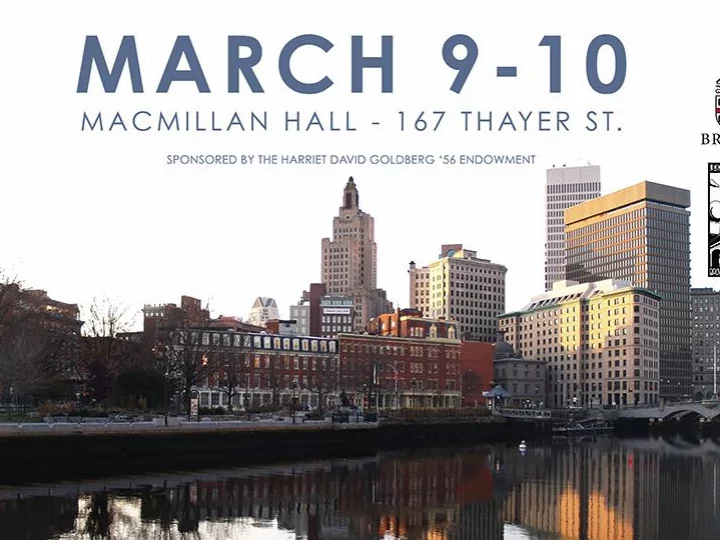

March 9-10, 2012 Urban Studies Program Brown University
Decennial Urban Conferences: Taking Stock of Changes in the City In 1982, 1992, and 2002, Brown University sponsored large conferences that have drawn key leaders and scholars to discuss urban issues. The first two conferences shared the theme, "Who Will Save the American City?" In 1982, speakers considered housing, the economy, organized labor, crime, and the urban poor. They worried about what was then the "new” face of the soup kitchen, food pantry, and “skid row.” Hunger and homelessness are still urban problems today. In 1992, the conference featured big city mayors. The topics included relations between cities and suburbs, and again, urban poverty and the economy. It closed with proposals for “a new agenda for the 21 st century,” but urban affairs have fallen to the bottom of the contemporary political agenda. The theme of the 2002 conference, “The City: No Limits,” raised some new concerns: urban education, international immigration, economic innovation, and the role of culture and a “thriving arts scene” in promoting dynamic cities. Author Tom Wolfe was keynote speaker. Cities are now moving beyond the narrow emphasis on “creative capital” as an economic driver to consider how the urban anchor institutions of Eds & Meds can nurture bio- medical and high technology zones, such as Portland State’s partnerships in HUD’s Evidence Matters (Winter 2012) and Providence’s Knowledge District.
City off the hill The 2012 urban affairs conference starts with a different premise. It rejects the idea of a single “savior” of the city, since no single person, sector, or institution suffices. Finding fresh solutions to perennial problems – poverty, unaffordable and segregated housing, unemployment, economic change, and environmental degradation -- will take the creative collaboration of many: those “on the hill” and in the city beyond. Solutions will be found only with the collaboration of people who differ in many ways, who may not be used to working together or who even view one another as foes. How can students and the university get off the hill and make the city work for everyone?
CONFERENCE THEMES Sustainable urbanism, envisioning the city anew Beyond silos, comprehensive planning Inclusive city-building, new partnerships
Sustainable urbanism, envisioning the city anew Sustainability: “Greening” Resource conservation/recovery, reducing footprints Alternative energy, green buildings, historical preservation, adaptive reuse, greening brown-fields, land trusts, new uses of rail lines, biking City itself is green: Parks, trees Urban food production Natural and Built Environments Interact Reconnecting with nature: not only greenery but wildlife Many kinds of livability The city is a social context for human activities Balance production and consumption Governance: preparing for disasters; coordinating competing interests Fitting activities together: Urban design
Sustainable urbanism, envisioning the city anew To achieve an inclusive, accessible, and sustainable city, urbanists are calling for: Renewed, high-tech, energy-efficient infrastructure denser, more affordable housing, preservation of cultural heritage and a sense of place pedestrian access to services, cycling, and energy- efficient transportation options green spaces, recreational land uses, and access to healthy food and living environments.
Beyond silos, comprehensive planning Traditionally, housing (and community development) and transportation systems were designed in isolation. Sometimes transportation spurred housing development, sometimes the reverse. Neither considered the provision of public open space. Foreclosure crisis cascading beyond housing Today, inter- agency “joined up” policymaking and public-private partnerships
Inclusive city-building, new partnerships Public and private sectors often operated independently. Nonprofit sector in housing and transportation are increasingly important partners.
Providence Greening the Knowledge District Green and Healthy Homes Initiative (Providence and Pittsburgh!) Project Rebuilt Act, SWAP, and other partners The Box Office – shipping containers – by The Box Office
Panels and Speakers Opening Panel to set the theme of comprehensive sustainable urbanism and smart growth Second Panel with representatives of 3 federal agencies now working together productively under Obama Administration urban policy Third, Providence Mayor Tavares will introduce Pittsburgh Mayor Ravenstahl Reception
Panels and Speakers: Saturday 10 am Transportation Alternatives Followed by Greening the Urban Environment Affordable and Efficient Housing Reflections on Sustainable Urbanism
Thank yous Harriet David Goldberg ‘56 Endowment Urban Studies DUG Media Technology Services Office of Public Affairs and University Relations Heather Parker
Recommend
More recommend